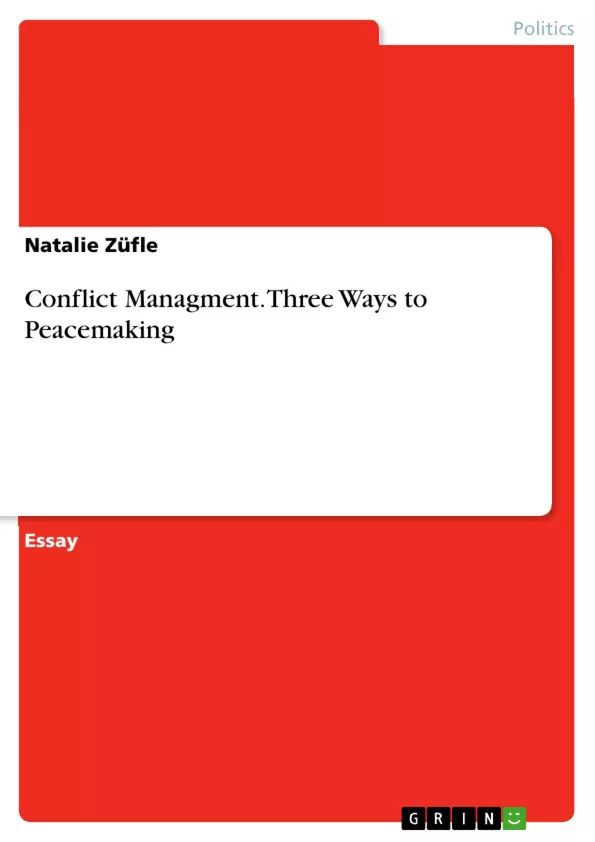The more promising and feasible the incentives on each layer of the opportunity structure, the more leading figures on the respective levels ‘buy in’, the greater the probability that a peace accord comes about. However, the issue of “incentive incapability” has to be kept always in mind, meaning that incentives can only function well if there are enough countries, NGOs etc. willing to invest and provide resources (Walter 1999, p. 130).
Inhaltsverzeichnis (Table of Contents)
- Multi-layered Opportunity Structure
- Long-term Incentives
- Time-sensitive Incentives
- Global Incentives
Zielsetzung und Themenschwerpunkte (Objectives and Key Themes)
This essay aims to examine the application of incentives within a multi-layered opportunity structure, specifically focusing on how these incentives can be used to encourage reluctant conflict parties to sign peace accords.
- The Multi-layered Opportunity Structure and its influence on peacemaking
- The use of incentives to encourage reluctant conflict parties to sign peace accords
- Different types of incentives, including long-term, time-sensitive, and global incentives
- The impact of incentives on various levels of leadership (top, mid-range, and grassroots)
- The importance of considering the issue of "incentive incapability" and the need for sufficient resources and investment
Zusammenfassung der Kapitel (Chapter Summaries)
The essay focuses on the three types of incentives that can be applied within a multi-layered opportunity structure to encourage reluctant conflict parties to sign peace accords. These include long-term incentives, time-sensitive incentives, and global incentives. The essay discusses how each type of incentive can influence different levels of leadership and how they can contribute to a more sustainable peace. It also highlights the importance of considering the issue of "incentive incapability" and the need for sufficient resources and investment.
Schlüsselwörter (Keywords)
This essay explores key concepts related to conflict management and peacemaking, including multi-layered opportunity structure, incentives, peace accords, capacity building, demilitarization, disarmament, and global resources. The essay examines the application of these concepts in the context of encouraging reluctant conflict parties to sign peace accords.
Frequently Asked Questions
What are the three ways to peacemaking discussed?
The essay focuses on long-term incentives, time-sensitive incentives, and global incentives within a multi-layered opportunity structure.
How do incentives help in conflict management?
Incentives encourage reluctant parties to "buy in" to peace accords by offering economic, political, or social benefits on different levels of leadership.
What is "incentive incapability"?
It refers to the problem where incentives fail because there are not enough countries or NGOs willing to provide the necessary resources and investments.
Which levels of leadership are targeted in peacemaking?
The structure targets the top-level (political leaders), mid-range (influential figures), and grassroots (local communities) levels.
Why are global incentives important?
Global incentives connect local peace efforts to international resources and support, increasing the sustainability of the peace accord.
What role do NGOs play in this structure?
NGOs are crucial for providing the resources, capacity building, and monitoring required for the incentives to function effectively.
- Quote paper
- Natalie Züfle (Author), 2009, Conflict Managment. Three Ways to Peacemaking, Munich, GRIN Verlag, https://www.hausarbeiten.de/document/180053


